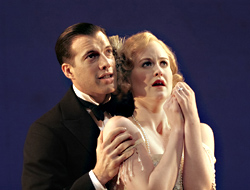Seattle Rep’s production of The Great Gatsby opens with a scene of surprising power. Onto a stage flooded with thick mist and suffused with hazy light strolls the Saxman (David J. Wright III); bending slowly to his instrument, he blows long and airy notes, a jazzy foghorn sounding into the twilight. After a moment, a clearer light shines into this white cloud, silhouetting a man in a trench coat, a shadowy figure straight out of a Fritz Lang film. He appears to be levitating in the ether, suspended in a dream of self. The man strikes a match, lights the cigarette in his mouth.
There’s no mistaking: This is Jay Gatsby, his far-off gaze maybe seeking the promise of Daisy Buchanan’s distant green light. Another man, very much a creature of this earth, walks into the foreground and begins: “If personality is an unbroken series of successful gestures, then there was something gorgeous about him. . . . ” It’s a kind of still life that captures what is momentous and elemental and fleeting in Gatsby’s character. Ironically, the rest of the play, adapted by Simon Levy and directed by David Esbjornson, doesn’t live up to the excitement and promise of this opening; it can’t. The production, lacking the imaginative force of its prologue, is borne back ceaselessly into the mundane.
It’s F. Scott Fitzgerald’s crackerjack prose—economical and unsentimental, seamlessly woven, always just right—that makes The Great Gatsby the nearest we’ve got to a great American novel. The story of millionaire Jay Gatsby’s romantic rise and tragic fall, conceived in the clickety-clack cauldron of the Jazz Age, remains not only a perfect autopsy of the American dream but a timelessly epic meditation on the vagaries of love and fate. Any adaptation of Fitzgerald’s classic is, simply, up against a masterpiece; any thought of improvement is folly. To capture on stage or screen even a glint of Gatsby’s mystique, one must move beyond the straight architecture of the narrative and instead traffic in essential moments that delve into the novel’s mythic quality. Seattle Rep’s production fails by relying too heavily on a linear recounting, telling us nothing new about a book that, it’s safe to assume, everyone is familiar with. There is, to be sure, a certain satisfaction in beholding, once again, the story of Gatsby’s downfall, but satisfaction is not revelation, and such faithful reproductions lack magic.
Esbjornson does the best he can with the script, keeping the pacing and rhythm swift and sure. Some of the casting is inspired. Lorenzo Pisoni is not at first an obvious fit for Gatsby, but as things progress, his chiseled good looks and broadly phatic demeanor begin to reveal the character’s cipherlike qualities. Also good is Matthew Amendt as Nick Carraway, despite moments when his reserve gives way and his narration, lifted from the book, verges on the hysterical. Cheyenne Casebier is perfect as Jordan Baker, compromised tennis pro and Nick’s love interest. Erik Heger doesn’t quite capture Tom Buchanan’s jocklike loutishness; as his wife, Daisy, Heidi Armbruster comes on a little too loud and eager, though her frantic behavior does get at the sadness and romantic anxiety that seems to drive Gatsby’s love object. Sean G. Griffin is good as Gatsby’s associate Meyer Wolfsheim, and Kathryn Van Meter is appropriately campy and trashy (sometimes a bit too) as Tom’s mistress, Myrtle Wilson.
As promising as is the misty opening, Gatsby‘s penultimate scene, conversely, sums up what’s wrong with this adaptation. As Gatsby floats lazily in his pool, into full view sneaks Myrtle’s husband, George Wilson (Bradford Farwell), pistol in hand. He fires several shots into Gatsby, who flinches and spasms with each hit. It’s altogether too much information, a literal reading obscuring the larger tragedy: Gatsby’s death becomes a coarse matter of criminal intent rather than the fateful death of an impossible dream.








